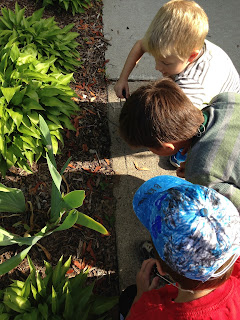I'd like to suggest a very close-to-home nature study you can do whether you are in an urban setting with lots of concrete about, or not enough energy or time to give up the afternoon for a road trip to a nature area or trail, or interested in a longer study of live creatures right in your home.
It's the ant farm. Ants are readily available and if you insist that there are none around, empty a bit of sugar onto your counter and you will be rewarded with a slew of them. A less intrusive idea would be to leave a sticky mess of candy outside and check it in a day or so.
I went to the dollar store and purchased a glass spaghetti jar and a plastic water bottle. Anything that fits inside one of the other leaving a narrow gap between them will work. Have your children find some dirt and fill up that gap.
We punched holes in the lid with a hammer and nail. The problem was that the holes were large enough for ants to pass through. Not good. We closed them again with tape and made smaller holes. The best idea is to capture large ants!
Go out and find those ants. The easiest idea is to find an ant hill, dig deep around it then have everyone scoop like crazy with soup spoons. Ants scatter quickly! Make sure you get ants and eggs. The jackpot would be to have found a queen ant. You can also look under rocks and patio stones.
Once your ant farm has been filled dirt, eggs and ants, make a heavy paper cover to put around the outside of it to give those ants the underground feeling. Add a sweet snack for them and a cotton ball soaked in water for their drink.
You can slide off the paper sleeve for a bit every day to see what the ants have been up to.
Charlotte Mason wants us to make entries into our nature notebooks including painting and notes about what we observe. The ant farm gives an opportunity to spend time studying the same creature over a longer time period. This is part of what she called 'special studies'.
"They are expected to do a great deal of out-of-door work in which they are assisted by The Changing Year, admirable month by month studies of what is to be seen out-of-doors. They keep records and drawings in a Nature Note Book and make special studies of their own for the particular season with drawings and notes." (Mason, Volume 6, p. 219)Older students can include a daily chart recording the increasing lengths of the trails and the number of the eggs and ants. You can see how nature study is the precursor for science study. This is what J. H. Fabre was famous for: close observation of small creatures over long periods of time. Fabre not only recognized the insects he studied but he knew them and their ways. This is your opportunity to know about ants.








